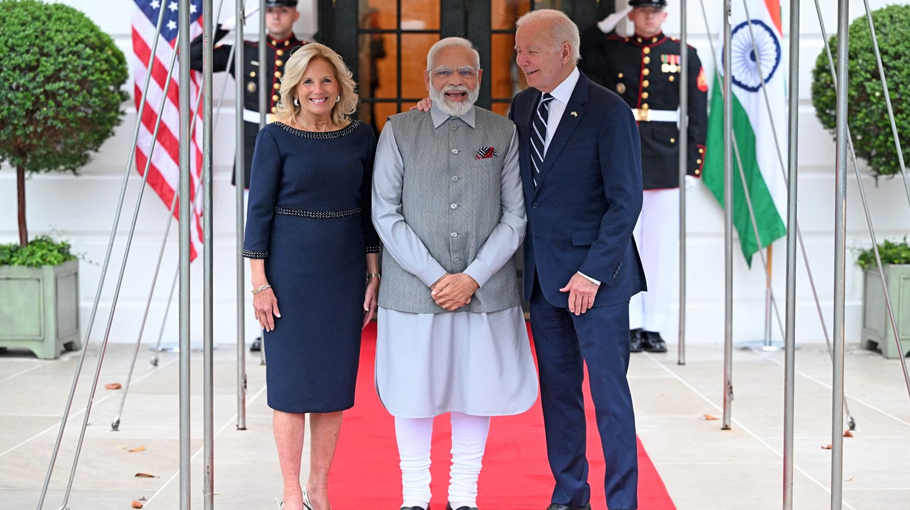US rolls out red carpet for Indian PM Modi

Indian Prime Minister Narendra Modi on Wednesday opened a state visit to Washington as the United States steps up its wooing of India despite simmering disagreements on Ukraine and human rights.
President Joe Biden is putting on the full pomp for only the third state visitor of his administration, with the billion-plus country seen as a pivotal partner in a growing global competition with China.
Modi -- flying in from New York where he exerted Indian soft power with a public yoga demonstration -- kicked off his visit with an intimate private dinner with Biden at the White House.
On Thursday, India's most powerful leader in decades will be welcomed with full military honors at the White House, address a joint session of Congress and be feted by a state dinner.
The White House tapped a top California-based plant-based chef for the dinner for Modi, a strict vegetarian. Unusually for a leader who often criticizes the press, the White House said Modi will take questions alongside Biden.
People following the trip expect a series of significant announcements, including likely a deal for General Electric to supply engines for India's first home-grown fighter jets.
The world's two largest democracies are also likely to make announcements on climate, one area where the two countries have long clashed, albeit politely, on the responsibilities of developed versus developing countries.
The United States has been seeking a closer relationship with India since the late 1990s, seeing the nation as like-minded both on the challenges of China.
Speaking to reporters ahead of the visit, National Security Council spokesman John Kirby played down the connection to China -- which Secretary of State
Antony Blinken visited earlier in the week in a bid to lower the temperature
after soaring tensions.
"It's not about sending a message to China," Kirby said.
"We are deepening and continuing to improve this partnership with India,
which we believe has truly become a force for global good. And we know that
India is going to be a strategic partner for decades to come," he said.
But he implicitly acknowledged India's strategic location, saying, "They are
showing a growing commitment to being more engaged in the Indo-Pacific."
- Playing down differences -
It will be Modi's first state visit to Washington, an honor extended to his
center-left predecessor Manmohan Singh by Barack Obama.
Biden, however, has already welcomed Modi as part of a summit of the so-
called Quad -- an initiative of four democracies including Japan and
Australia that is widely seen as countering China's influence in Asia.
Modi had developed a close relationship with Biden's predecessor Donald
Trump, endearing himself by arranging a massive rally in his home state of
Gujarat for the fellow right-wing populist.
The Biden administration has vowed a greater focus globally on human rights
but has kept a light touch with Modi, who has faced mounting criticism from
human rights groups.
But India has otherwise largely enjoyed a pass from the United States
including over Russia, which Biden is seeking to isolate over its invasion of
Ukraine.
Modi has refused to join Western-led sanctions on Moscow, which supported New
Delhi during the Cold War, and India has instead seized on the war to buy
Russian oil at discounted prices.
The muted US reaction comes in contrast with growing calls from Congress to
punish South Africa for its stance on Russia.
Rick Rossow, an India specialist at the Center for Strategic and
International Studies, said that the United States considered the long-term
concern about China -- over which India is aligned with the United States --
as greater than any gap on Russia.
"There are going to be areas that pop up where you're going to have
divergence. But the convergence is big enough where I think it'll outweigh
everything," he said.




